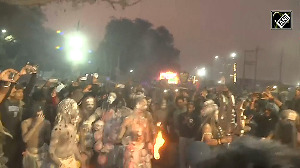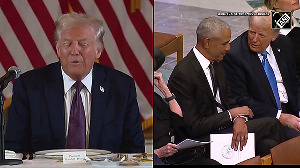'By notifying that the I&B ministry will initiate such proceedings, the government was arrogating for itself the role of policing the media,' the Guild said.

Photograph: Arko Datta/Reuters
The Editors Guild of India 'strongly' condemned the information and broadcasting ministry's guidelines to check fake news, saying the norms, which were withdrawn on Tuesday, would have opened the door for frivolous complaints to harass journalists and organisations.
The statement came after Prime Minister Narendra Modi on Tuesday ordered the information and broadcasting ministry to cancel its contentious guidelines on fake news, after the ministry's move attracted widespread criticism.
'The Editors Guild of India strongly condemns the arbitrary manner contemplated by the Union Information and Broadcasting (I & B) Ministry ostensibly to penalise any journalist or media organisation publishing fake news,' it said.
'By notifying that the I&B ministry will initiate such proceedings, the government was arrogating for itself the role of policing the media. It would have opened the door for frivolous complaints to harass journalists and organisations to fall in line,' it added.
Amending the guidelines for accreditation of journalists, the ministry on Monday night announced norms to contain fake news which said if the publication or telecast of fake news was confirmed, accreditation of the journalist would be suspended for six months in case of first violation and for one year in case of a second violation.
In case of a third violation, his or her accreditation would be cancelled permanently, the ministry had said in a press release.
The Guild said it 'acknowledges the intervention of the Prime Minister's Office to withdraw the I&B ministry's notification but remains deeply disturbed that faith continues to be reposed on the Press Council of India (PCI) to deliver justice on such issues'.
The ministry norms had also said any complaint of instances of fake news would be referred to the PCI, if it pertains to print media, and to the News Broadcasters Association, if it relates to the electronic media, for determination of the news item being fake or not within 15 days.
Once the complaint is registered for determination of fake news, the accreditation of the journalist, whoever 'created and/or propagated' the fake news, will be suspended till the determination regarding the fake news is made, the ministry had said.
'The recent reconstitution of the Press Council of India has been done in a manner that gives rise to doubts over the independence of the institution and its ability to play neutral umpire. The Guild's nominees to the PCI were disallowed on technical grounds,' the statement said.
Also, the recent reconstitution of the Central Press Accreditation Committee has raised questions over the non-transparent processes being followed by the ministry as the Guild's application was ignored, it said.
The Guild said that 'fake news' is a process that cannot be left to governments to initiate action when, on many occasions, the governments and the parties in power - both at the Centre and in the states -- are charged with propagating fake news themselves.
'Moreover, news organisations are not the only source of generation of fake news with the country awash with digital platforms of all hues and opinions that operate without constraints and have the potential to cause far more damage,' it said.
The Guild said it has always stood for observing the highest journalistic standards and was willing to work with the central and state governments and media bodies to define what can be constituted as ‘fake news' and take action against those found guilty of propagating such news without compromising on the independence and freedom of the media.
Nothing wrong if govt intends to check fake news: PCI
There is nothing wrong or obnoxious if a government intends to take remedial steps to check fake news but an independent statutory authority should decide on its veracity, the Press Council of India said on Tuesday.
The PCI, in a statement signed by chairman Justice (retd) C K Prasad, said 'no prudent person should or can justify' the dissemination of fake news.
'Fake news is a global menace and if any government intends to take remedial steps to check its spread , per se, there is nothing wrong or obnoxious about it, provided that the authority to decide the truthfulness or otherwise of an allegation of fake news is entrusted to an independent statutory body like the Press Council of India,' it said in the statement.
The PCI said fake news means news, story, information, data and reports which are wholly or partly false.
The PCI said the complaint of fake news filed by an individual, government or any other aggrieved person is dealt with by the Council following procedures laid down in the Press Council Act and Press Council (Procedure for Inquiry) Regulations.
'However, it is only in gross cases of fake news or repeated involvement in fake news dissemination that the power to suspend or cancellation of accreditation of the journalists (should) be resorted to. The allegations need to be determined by the Council before any action is called for,' the PCI said.











 © 2025
© 2025